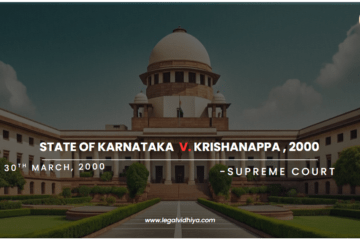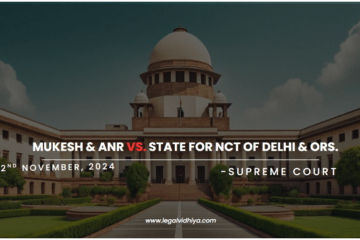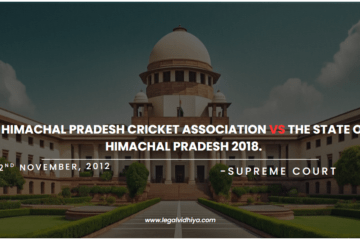| Citation | 1986 SCC (3) 596 |
| Date of Judgment | 13 August 1986 |
| Court | The Supreme Court of India |
| Case Type | Constitutional and Criminal |
| Appellant | Sheela Barse and Ors |
| Respondent | The Union of India |
| Bench | Justice P.N Bhagwati, Justice Rangnath Mishra |
| Referred Statutes | Constitution of India Article 32 Article 39(f) and 21Indian Lunacy Act 1912 and Mental Health act 1987 |
FACTS OF THE CASE
Sheela Barse is a journalist and a veteran socialist who wrote a letter to the Supreme Court, addressing concerns about custodial violence against women and requesting permission to visit jails, children’s homes, remand homes, borstal schools, and all other institutions connected with the housing of delinquent children.
During an interview conducted in Bombay jails, she discovered that five women were being assaulted, both mentally and physically, by the police. Two of these women were foreigners who had been duped and defrauded by their lawyers. These lawyers took most of their jewels, claiming they were retaining them as fees.
The Supreme Court considered her letter as a writ petition filed under Article 32 of the Indian Constitution and raised concerns about judicial violence against women in prisons. Additionally, she questioned the imprisonment of children below 18 years of age, which may be a violation of Article 39, Clause (f), added after the 1976 amendment some children are jailed for a very long time even they are mentally ill.
It makes courts to questions about whether the district and sessions judges were effectively fulfilling their duty to visit jails and sub-jails, as they are designated as visitors in the jail manual and are responsible for ensuring strict compliance with these guidelines.
ISSUES
Issues in front of supreme court is as follow-
- Are there provisions addressing the violation of human rights of female prisoners and the issue of deplorable prison conditions in the case?
- Is there adequate monitoring and reporting of the conditions of children and women in judicial custody?
- Weather the speedy trial is the fundamental right of accused under article 21?
ARGUMENTS
Plaintiff argued that the basic human rights of female prisoners were consistently being violated by the police, and she questioned the custodial violence, which encompassed both physical and mental abuse. She drew attention to instances of abuse and violence carried out by law enforcement personnel against female prisoners. Additionally, she raised concerns about the detention of children under the age of 18, emphasizing the need to provide them with a healthy environment, as stipulated under Article 39 (f).
JUDGEMENT
Ranganath Misra, J. :
The Supreme Court issued various directions with regard to physically and mentally challenged children, as well as abandoned or destitute children who were lodged in various jails in the country under ‘safe custody.’ In response to this situation, the court further directed the Director General of Doordarshan and the Director General of All India Radio to give publicity, seeking cooperation from non-governmental organizations and social service organizations in the task of rehabilitating these children. The court expressed deep concern and anguish over the fact that these children were being kept in jails instead of being properly cared for, provided with adequate medical treatment, and given training in various skills that would enable them to become independent and self-reliant.
The nation’s children are a supremely important asset. Their nurture and solicitude are our responsibility. Children’s programme should find a prominent part in our national plants for the development of human resources, so that our children grow up to become robust citizens, physically fit, mentally alert and morally healthy, endowed with the skill and motivations needed by society
Additionally they also issue the directions about the term of punishment of child accused, it was issued that the offence punishable for more than 7 years is concerned we should regard a period of 3 months from the date of filing of filing of the complaint or lodging the first information report as the maximum time permissible for investigation and a period of 6 months for the filing of the charge sheet as a reasonable period of the trial of the child must be completed.
Order called upon the state government to bring into force and to implement vigorously the provisions of the children’s act enacted in various states. Court also suggests the central government to initiate the parliament legislation on the subject to bring uniformity.
The court also granted access to the petitioner, allowing her to visit jails, children’s homes, remand homes, observation homes, borstal schools, and all institutions connected with the housing of delinquent children. The petitioner is not an adversary, as she volunteered to do what the state should have done. The court directed respondent 1 to deposit the sum of Rs 10,000, for the time being, within two weeks in the registry of this court’s petition.
REFERENCES
https://www.manupatrafast.in/Pers/Personalized.aspx
https://scc.duelibrary.in/Members/SearchResult.aspx
https://indiankanoon.org/doc/525548/
This Article is written by Aleema of Delhi University Faculty of Law, Intern at Legal Vidhiya.




0 Comments